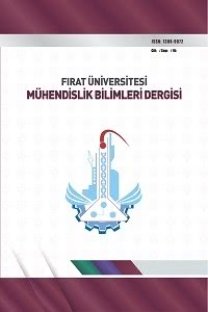Sıkıştırma İle Ateşlemeli Bir Motorda İzobütanol-Dizel Yakıtı Karışımlarının Kullanılmasının Egzoz Emisyonu Ve Motor Performansına Etkileri
Bu çalışmada sıkıştırma ile ateşlemeli bir motorda standart dizel yakıtına hacimsel olarak %3, %5, %8 ve %10oranlarında izobütanol ilavesinin farklı motor yüklerinde, motor performansına ve egzoz emisyonlarına etkilerideneysel olarak incelenmiştir. Deneylerde 4 zamanlı tek silindirli, direkt püskürtmeli bir motor kullanılmıştır.Deneylerden elde edilen veriler standart dizel yakıtı ile karşılaştırılarak grafikler halinde sunulmuştur. Buçalışma sonucunda, standart dizel yakıtına katılan izobütanol miktarı arttıkça özgül yakıt tüketiminin arttığı, frentermik veriminin ve egzoz gaz sıcaklığının azaldığı gözlemlenmiştir. Ayrıca NOx, CO ve is emisyonlarıazalırken, HC emisyonları artmıştır.
The Effects of Isobutanol-Diesel Fuel Blends Utilization on a Compression-Ignition Engine Performance and Emissions
In this study, a compression-ignition engine were experimentally tested with addition rates of izobutanol tostandard diesel fuel by volume of 3%, 5%, 8% and 10% to investigated the effects on engine performance andexhaust emissions during different engine loads. In these experiments, 4-stroke, single cylinder, direct injected, acompression-ignition engine was used. The data were obtained from the experimental studies compared withstandard diesel fuel and presented in graphs. At the end of this study was observed that when the amount of theizobutanol in standard diesel fuel was increased the specific fuel consumption also increases while the brakethermal efficiency and exhaust gas temperature were decrease. Additionally, increases in HC emissions, NOx,CO and smoke emissions were reduced.
___
- 1. Aydın, H. İlkılıç, C. (2010). Effect of ethanol blending with biodiesel on engine performance and exhaust emissions in a CI engine, Applied Thermal Engineering, 30, pp 1199-1204. 2. Öğüt, H. Oğuz, H. (2006). Üçüncü Milenyum Yakıtı Biyodizel 2.Baskı, Nobel Yayın Dağıtım, Ankara, pp 1- 25 3. Topal, M. Arslan, E. I. (2008). Biyokütle Enerjisi ve Türkiye, VII. Ulusal Temiz Enerji Sempozyumu UTES2008, İstanbul, pp 241-248. 4. Chunde Yao, C. S. Cheung, Chuanhui C. Yinshan Wang Chan, S. C. Lee (2008). Effect of Diesel/methanol compound combustion on Diesel engine combustion and emissions, Energy Conversion and Management, 49, pp16961704 5. Bilgin, A. Durgun, O. Sahin, Z. (2002). The effects of diesel ethanol blends on diesel engine performance, Energy Sources, 24, pp 431-440. 6. Karabektaş M. Ergen G. Hoşöz M. (2008). The effects of preheated cottonseed oil methyl ester on the performance and exhaust emissions of a diesel engine, Applied Thermal Engineering, 28, pp 21362143 7. Abu-Quadis M. Haddad O. Qudaisat M. (2000). The effect of alcohol fumigation on diesel engine performance and emissions, Energy Conversion and Management 41, pp 389399. 8. Lapuerta M. Armas O. Herreros J. M. (2008). Emissions from a dieselbioethanol blend in an automotive diesel engine, Fuel, 87 pp 2531. 9. İnternet: http://en.wikipedia.org/wiki/Butanol_fuel, (25.03.2013). 10. Karabektaş, M. Hoşsöz, M. (2009). Performance and emission characteristics of a diesel engine using isobutanoldiesel fuel blends, Renewable Energy, 34 pp 1554 1559. 11. Heywood, J. B. (1988). Internal combustion engine fundamentals, Mc Graw-Hill, Newyork, pp 90-240. 12. Alasfour F. N. (1998). NOx emissions from spark ignition engine using % 30 iso-butanol gasoline blend: part 1 preheating inlet air, Applied Thermal Engineering, 18 pp 245256. 13. İlkılıç, C. Behçet, R. Aydın, S. Aydın, H. (2009). Dizel motorlarında azot oksitlerin oluşumu ve kontrol yöntemleri, 5. Uluslararası ileri Teknolojiler Sempozyumu (IATS09), Karabük, 1: pp 2062-2066. 14. Al-Hasan, M. I. Al-Momany, M. (2008). The effect of iso-butanol-diesel blends on engine performance, Dept. of Mechanical Engineering, Al-Balqa Applied University, P.O. Box 15008 Amman, 11134 Jordan, 23 pp 306-310. 15. Rakopoulos, C. D. Dimaratos, A. M. Giakoumis, E. G. Rakopoulos. D. C. (2010). Investigating the emissions during acceleration of a turbocharged diesel engine operating with bio- diesel or n-butanol diesel fuel blends, Energy, 35 pp 51735184. 16. Doğan, O. (2011). The influence of n- butanol/diesel fuel blends utilization on a small diesel engine performance and emissions, Fuel, doi:10.1016/j .fuel.2011.02.033. 17. Rakopoulos, D. C. Rakopoulos, C. D. Giakoumis, E. G. Dimaratos, A. M. Kyritsis, D. C., (2010). Effects of butanoldiesel fuel blends on the performance and emissions of a high-speed DI diesel engine, Energy Convers Manage, 51 pp 19891997. 18. Yao, M. Wang, H. Zheng, Z. Yue, Y. (2010). Experimental study of n-butanol additive and multi-injection on HD diesel engine performance and emissions, Fuel, 89 pp 21912201. 19. Salman, S. Çınar, C. Topgül, T. Haşimoğlu, C. (2002). Bir dizel motorunda egzoz gazları, soğutma suyu ve sürtünmeler yoluyla kaybedilen ısı eenerjisinin belirlenmesi, Politeknik Dergisi, 5 pp 233-236. 20. Borat, O. Balcı, M. ve Sürmen, A. (2003). İçten Yanmalı Motorlar, Teknik Eğitim Vakfı Yayınları, Cilt 1. 21. Çetinkaya, S. (2011). Termodinamik, Nobel Yayın Dağıtım. 22. Rakopoulos, D. C. Rakopoulos, D. C. Hountalas, D. T. Kakaras, E. C. Giakoumis, E. G. Papagiannakis, R. G. (2010). Investigation of the performance and emissions of bus engine operating on butanol/diesel fuel blends, Fuel, 89 pp27812790. 23. Balo, F. Kurtbaş, İ. Yücel, L. H. (2006). Bitkisel Yağların Dizel Yakıt Özellikleri, Doğu Anadolu Bölgesi Araştırmaları. 24. Özsezen A. N. Çanakçı M. (2008). Atık kızartma yağından elde edilen metil esterin ön yanma odalı bir dizel motorda kullanımının performans veemisyonlara etkisinin incelenmesi, Gazi Üniversitesi. Mühendislik Mimarlık Fakültesi Dergisi, 23, pp 395-404.
- ISSN: 1308-9072
- Yayın Aralığı: Yılda 2 Sayı
- Başlangıç: 1987
- Yayıncı: FIRAT ÜNİVERSİTESİ
Sayıdaki Diğer Makaleler
Karabakır Formasyonu Tüfitlerinin (Ağın, Elazığ) Tras Olarak Kullanılabilirliği
Piramidal Yüklü Ortagonal Basit Mesnetli Elastik Plakların Sonlu Farklar Metodu İle Çözümü
Dowel Numunelerinde Boyut Etkisi
Ölçeklendirme Yaklaşımlı GPU Tabanlı Seviye Kümesi Yöntemi Kullanan Görüntü Bölütleme
Sabit Mıknatıslı Senkron Motorun Uzay Vektör Modülasyonlu Doğrudan Moment Kontrolünün Benzetimi
ECG Sinyallerinde Gürültü Gidermek için Dalgacık Dönüşümünün FPGA Tabanlı Donanımsal Gerçeklemesi
Akciğer Mekaniğinin Elektriksel Modelinin Çıkarılması ve Basınç Dalga Şeklinin Elde Edilmesi
